定语从句只用that
- 格式:doc
- 大小:150.50 KB
- 文档页数:8
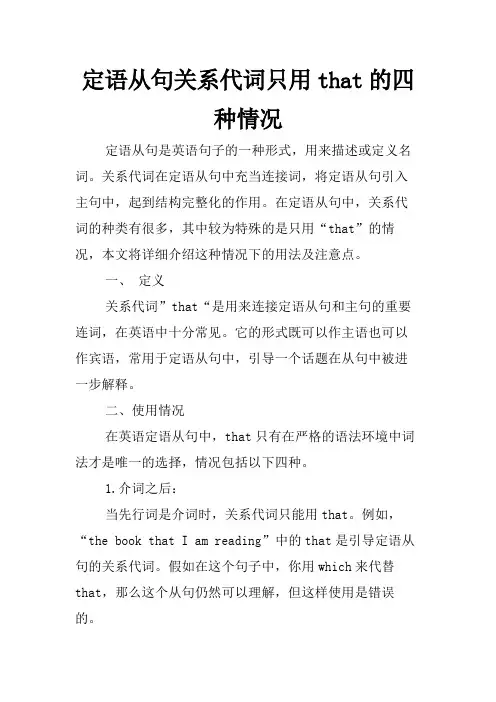
定语从句关系代词只用that的四种情况定语从句是英语句子的一种形式,用来描述或定义名词。
关系代词在定语从句中充当连接词,将定语从句引入主句中,起到结构完整化的作用。
在定语从句中,关系代词的种类有很多,其中较为特殊的是只用“that”的情况,本文将详细介绍这种情况下的用法及注意点。
一、定义关系代词”that“是用来连接定语从句和主句的重要连词,在英语中十分常见。
它的形式既可以作主语也可以作宾语,常用于定语从句中,引导一个话题在从句中被进一步解释。
二、使用情况在英语定语从句中,that只有在严格的语法环境中词法才是唯一的选择,情况包括以下四种。
1.介词之后:当先行词是介词时,关系代词只能用that。
例如,“the book that I am reading”中的that是引导定语从句的关系代词。
假如在这个句子中,你用which来代替that,那么这个从句仍然可以理解,但这样使用是错误的。
正确:The book that I am reading.错误:The book which I am reading.2.形容词之后:如果形容词修饰名词,其中包含有定语从句,而先行词又在从句里作宾语,就必须使用that。
例如,“This is the man that I saw on TV yesterday”。
正确:This is the man that I saw on TV yesterday.错误:This is the man which I saw on TV yesterday.3.最高级别形容词之后:当最高级别形容词修饰的名词在定语从句中作先行词时,只能用that,而不用which或者who。
例如,“This is the best d ay that I've ever had in my life”。
正确:This is the best day that I've ever hadin my life.错误:This is the best day which I've ever had in my life.4.不定代词之后:不定代词(如something,anything,nothing,everyone,everybody等)以及不定副词(如somewhere,anywhere,nowhere等)后面的定语从句,只能用that。
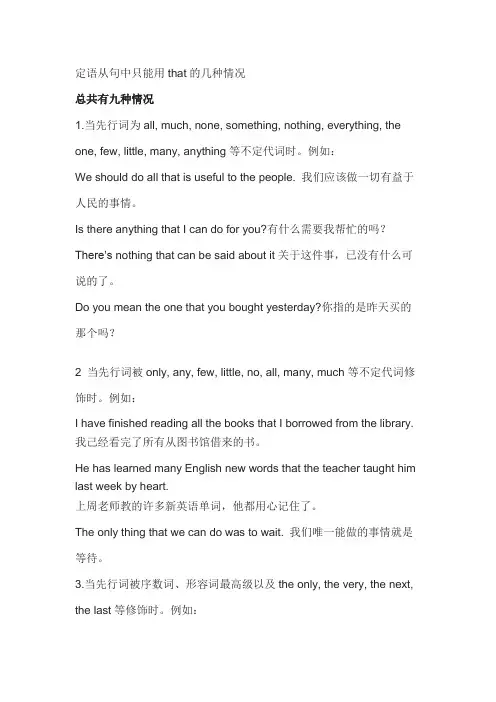
定语从句中只能用that的几种情况总共有九种情况1.当先行词为all, much, none, something, nothing, everything, the one, few, little, many, anything等不定代词时。
例如:We should do all that is useful to the people. 我们应该做一切有益于人民的事情。
Is there anything that I can do for you?有什么需要我帮忙的吗?There’s nothing that can be said about it关于这件事,已没有什么可说的了。
Do you mean the one that you bought yesterday?你指的是昨天买的那个吗?2 当先行词被only, any, few, little, no, all, many, much等不定代词修饰时。
例如:I have finished reading all the books that I borrowed from the library. 我己经看完了所有从图书馆借来的书。
He has learned many English new words that the teacher taught him last week by heart.上周老师教的许多新英语单词,他都用心记住了。
The only thing that we can do was to wait. 我们唯一能做的事情就是等待。
3.当先行词被序数词、形容词最高级以及the only, the very, the next, the last等修饰时。
例如:This is the first book that I bought in the shop . 这是我在这家书店买的第一本书。
This is one of the most exciting football games that I have ever watched 这是我看过的最激动人心的足球赛之一。
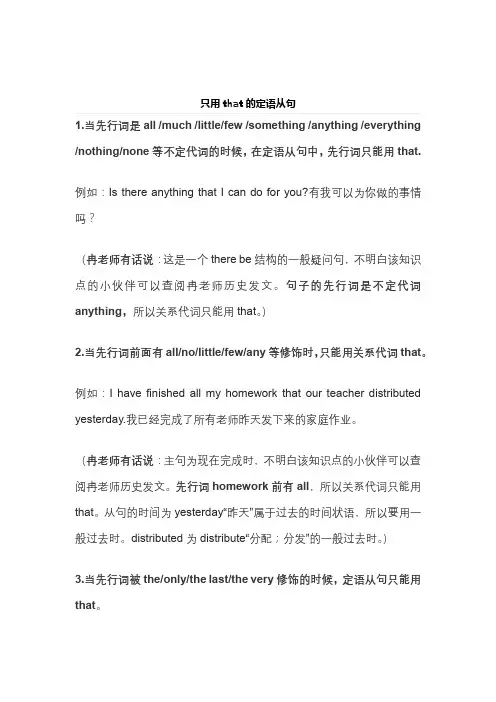
1.当先行词是all /much /little/few /something /anything /everything /nothing/none等不定代词的时候,在定语从句中,先行词只能用that.例如:Is there anything that I can do for you?有我可以为你做的事情吗?(冉老师有话说:这是一个there be结构的一般疑问句,不明白该知识点的小伙伴可以查阅冉老师历史发文。
句子的先行词是不定代词anything,所以关系代词只能用that。
)2.当先行词前面有all/no/little/few/any等修饰时,只能用关系代词that。
例如:I have finished all my homework that our teacher distributed yesterday.我已经完成了所有老师昨天发下来的家庭作业。
(冉老师有话说:主句为现在完成时,不明白该知识点的小伙伴可以查阅冉老师历史发文。
先行词homework前有all,所以关系代词只能用that。
从句的时间为yesterday“昨天”属于过去的时间状语,所以要用一般过去时。
distributed为distribute“分配;分发”的一般过去时。
)3.当先行词被the/only/the last/the very修饰的时候,定语从句只能用that。
例如:Eating is the only thing that interest me.吃是唯一一件使我感兴趣的事情。
(冉老师有话说:该句子的先行词是thing且用了the only修饰,所以关系代词只能用that。
关于动词ing形式做主语的语法冉老师会在后期更新。
)4.当先行词是序数词或被序数词修饰时,关系词只能用that。
例如:I'm the first student that passed the exam.我是第一个通过考试的人。
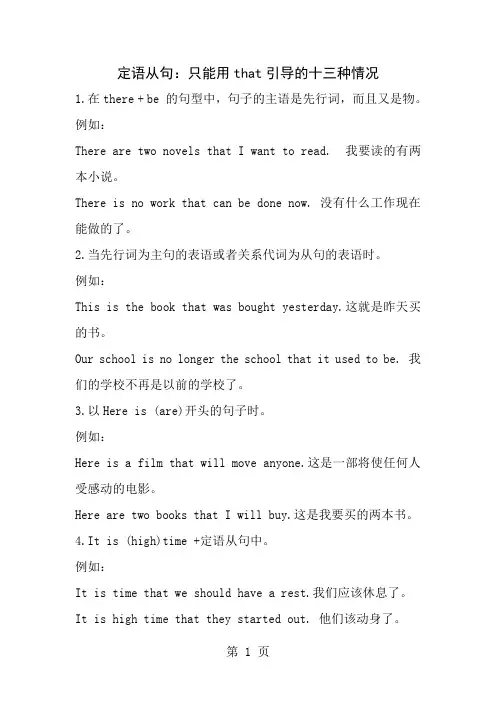
定语从句:只能用that引导的十三种情况1.在there + be 的句型中,句子的主语是先行词,而且又是物。
例如:There are two novels that I want to read. 我要读的有两本小说。
There is no work that can be done now. 没有什么工作现在能做的了。
2.当先行词为主句的表语或者关系代词为从句的表语时。
例如:This is the book that was bought yesterday.这就是昨天买的书。
Our school is no longer the school that it used to be. 我们的学校不再是以前的学校了。
3.以Here is (are)开头的句子时。
例如:Here is a film that will move anyone.这是一部将使任何人受感动的电影。
Here are two books that I will buy.这是我要买的两本书。
4.It is (high)time +定语从句中。
例如:It is time that we should have a rest.我们应该休息了。
It is high time that they started out. 他们该动身了。
5.当先行词是way等词时,关系代词用that或者in which在定语从句中作方式状语时,在口语中,常可省略。
例如:This is the way that my father did this work.这就是我父亲做此工作的方式。
She admired the way in which I answered the questions. 她羡慕我回答问题的方式。
6.在双重限定性定语从句中,如果一个从句用who或者which引导时,那么另一个从句用that引导。
例如:He is the student that I have ever see who can jump highest.他是我曾经看到过跳得最高的学生。
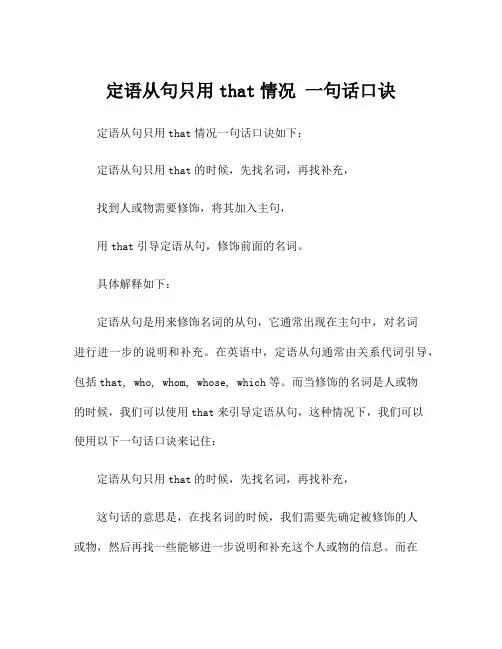
定语从句只用that情况一句话口诀定语从句只用that情况一句话口诀如下:定语从句只用that的时候,先找名词,再找补充,找到人或物需要修饰,将其加入主句,用that引导定语从句,修饰前面的名词。
具体解释如下:定语从句是用来修饰名词的从句,它通常出现在主句中,对名词进行进一步的说明和补充。
在英语中,定语从句通常由关系代词引导,包括that, who, whom, whose, which等。
而当修饰的名词是人或物的时候,我们可以使用that来引导定语从句,这种情况下,我们可以使用以下一句话口诀来记住:定语从句只用that的时候,先找名词,再找补充,这句话的意思是,在找名词的时候,我们需要先确定被修饰的人或物,然后再找一些能够进一步说明和补充这个人或物的信息。
而在找到这些信息之后,我们就可以将它们加入到主句中,然后用that引导定语从句,修饰前面的名词。
举个例子来说明:假设我们要表达的句子是:I have a friend. My friend is a doctor.此时,我们可以使用定语从句来简化这两个句子,形成一个复合句。
首先,我们需要找到被修饰的名词,即friend,在这个名词后面,我们可以进一步补充一个信息,即他是一名医生。
所以最终的句子可以是:I have a friend that is a doctor.在这个例子中,定语从句只用了that来引导,修饰了前面的名词friend,并且提供了进一步的信息,即他是一名医生。
总结一下,定语从句只用that情况下的口诀是帮助我们记住如何找到被修饰的名词以及如何将补充信息加入到主句中,然后用that引导定语从句,进行进一步的修饰。
希望这个口诀可以帮助到你记忆定语从句的用法。
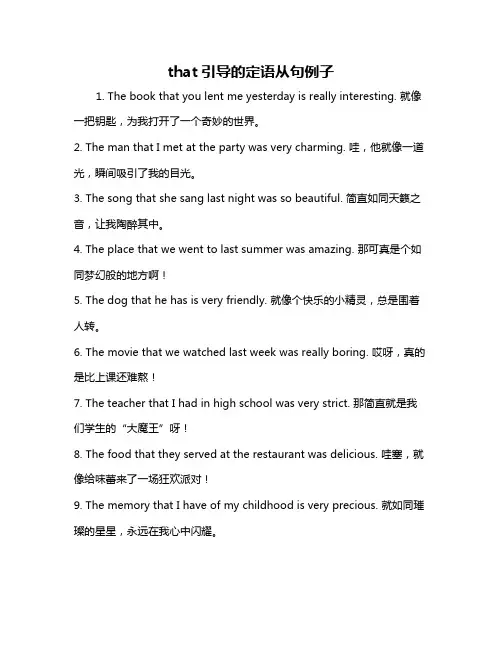
that引导的定语从句例子
1. The book that you lent me yesterday is really interesting. 就像一把钥匙,为我打开了一个奇妙的世界。
2. The man that I met at the party was very charming. 哇,他就像一道光,瞬间吸引了我的目光。
3. The song that she sang last night was so beautiful. 简直如同天籁之音,让我陶醉其中。
4. The place that we went to last summer was amazing. 那可真是个如同梦幻般的地方啊!
5. The dog that he has is very friendly. 就像个快乐的小精灵,总是围着人转。
6. The movie that we watched last week was really boring. 哎呀,真的是比上课还难熬!
7. The teacher that I had in high school was very strict. 那简直就是我们学生的“大魔王”呀!
8. The food that they served at the restaurant was delicious. 哇塞,就像给味蕾来了一场狂欢派对!
9. The memory that I have of my childhood is very precious. 就如同璀璨的星星,永远在我心中闪耀。
我的观点结论:that 引导的定语从句在生活中真是无处不在呀,它能让我们更准确地表达对人或事物的描述和感受。
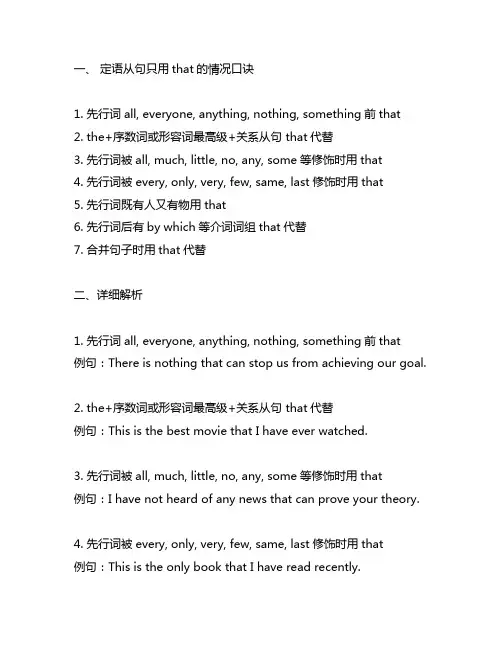
一、定语从句只用that的情况口诀1. 先行词all, everyone, anything, nothing, something前that2. the+序数词或形容词最高级+关系从句 that代替3. 先行词被all, much, little, no, any, some等修饰时用that4. 先行词被every, only, very, few, same, last修饰时用that5. 先行词既有人又有物用that6. 先行词后有by which等介词词组that代替7. 合并句子时用that代替二、详细解析1. 先行词all, everyone, anything, nothing, something前that例句:There is nothing that can stop us from achieving our goal.2. the+序数词或形容词最高级+关系从句 that代替例句:This is the best movie that I have ever watched.3. 先行词被all, much, little, no, any, some等修饰时用that例句:I have not heard of any news that can prove your theory.4. 先行词被every, only, very, few, same, last修饰时用that例句:This is the only book that I have read recently.5. 先行词既有人又有物用that例句:He is the only person that I trust in thispany.6. 先行词后有by which等介词词组that代替例句:He showed me the way that I could get to the 本人rport by the shortest path.7. 合并句子时用that代替例句:She told me that she wille to see me next week.以上便是定语从句中只用that的七种情况口诀,掌握了这七种情况,就能更加灵活地运用定语从句,使语言表达更加准确、地道。
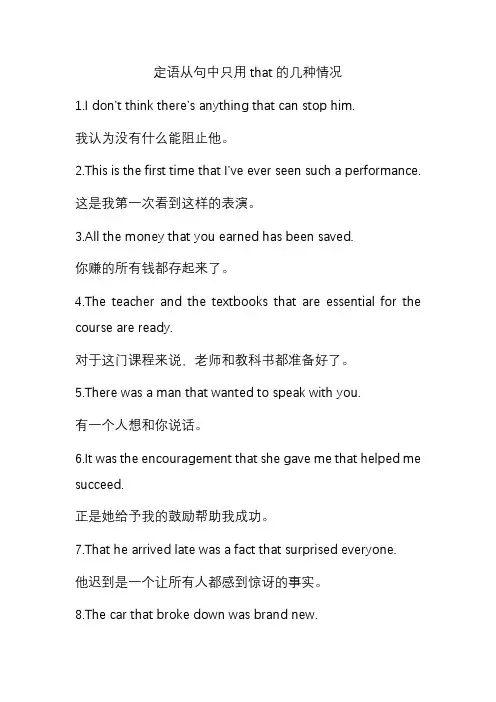
定语从句中只用that的几种情况
1.I don't think there's anything that can stop him.
我认为没有什么能阻止他。
2.This is the first time that I've ever seen such a performance.这是我第一次看到这样的表演。
3.All the money that you earned has been saved.
你赚的所有钱都存起来了。
4.The teacher and the textbooks that are essential for the course are ready.
对于这门课程来说,老师和教科书都准备好了。
5.There was a man that wanted to speak with you.
有一个人想和你说话。
6.It was the encouragement that she gave me that helped me succeed.
正是她给予我的鼓励帮助我成功。
7.That he arrived late was a fact that surprised everyone.
他迟到是一个让所有人都感到惊讶的事实。
8.The car that broke down was brand new.
那辆抛锚的车是全新的。
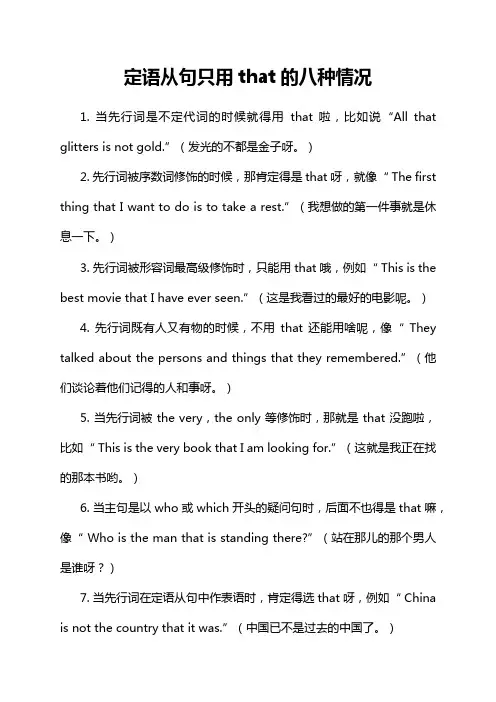
定语从句只用that的八种情况1. 当先行词是不定代词的时候就得用that 啦,比如说“All that glitters is not gold.”(发光的不都是金子呀。
)2. 先行词被序数词修饰的时候,那肯定得是 that 呀,就像“ The first thing that I want to do is to take a rest.”(我想做的第一件事就是休息一下。
)3. 先行词被形容词最高级修饰时,只能用 that 哦,例如“ This is the best movie that I have ever seen.”(这是我看过的最好的电影呢。
)4. 先行词既有人又有物的时候,不用that 还能用啥呢,像“ They talked about the persons and things that they remembered.”(他们谈论着他们记得的人和事呀。
)5. 当先行词被 the very,the only 等修饰时,那就是 that 没跑啦,比如“This is the very book that I am looking for.”(这就是我正在找的那本书哟。
)6. 当主句是以 who 或 which 开头的疑问句时,后面不也得是 that 嘛,像“ Who is the man that is standing there?”(站在那儿的那个男人是谁呀?)7. 当先行词在定语从句中作表语时,肯定得选 that 呀,例如“ China is not the country that it was.”(中国已不是过去的中国了。
)8. 当先行词是数词时,也得用 that 呀,像“ Three people died in the accident that happened yesterday.”(在昨天发生的事故中有三人丧生。
)我的观点结论就是:这些情况可都得记住呀,这样在使用定语从句的时候就不会出错啦!。
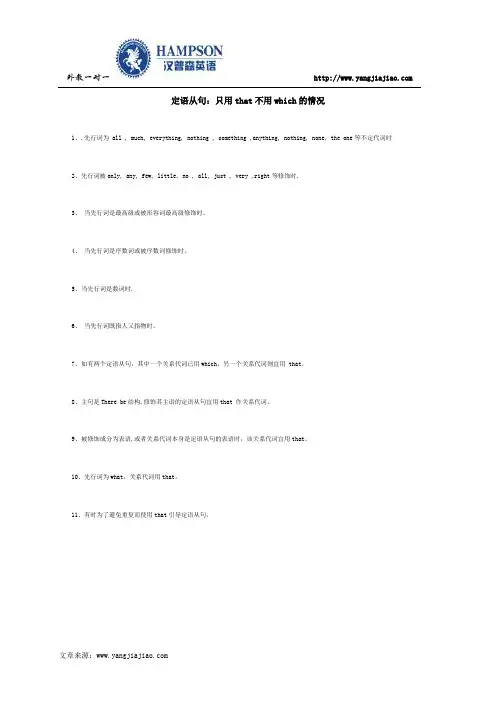
外教一对一
定语从句:只用that不用which的情况
1、.先行词为 all , much, everything, nothing , something ,anything, nothing, none, the one等不定代词时
2、先行词被only, any, few, little, no , all, just , very ,right等修饰时.
3、当先行词是最高级或被形容词最高级修饰时。
4、当先行词是序数词或被序数词修饰时。
5、当先行词是数词时.
6、当先行词既指人又指物时。
7、如有两个定语从句,其中一个关系代词已用which,另一个关系代词则宜用 that。
8、主句是There be结构,修饰其主语的定语从句宜用that 作关系代词。
9、被修饰成分为表语,或者关系代词本身是定语从句的表语时,该关系代词宜用that。
10、先行词为what,关系代词用that。
11、有时为了避免重复而使用that引导定语从句。
文章来源:。
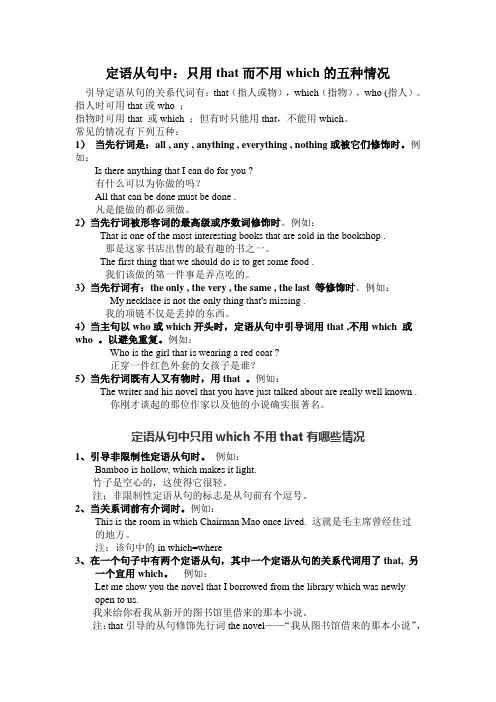
定语从句中:只用that而不用which的五种情况引导定语从句的关系代词有:that(指人或物),which(指物),who (指人)。
指人时可用that或who ;指物时可用that 或which ;但有时只能用that,不能用which。
常见的情况有下列五种:1)当先行词是:all , any , anything , everything , nothing或被它们修饰时。
例如:Is there anything that I can do for you ?有什么可以为你做的吗?All that can be done must be done .凡是能做的都必须做。
2)当先行词被形容词的最高级或序数词修饰时。
例如:That is one of the most interesting books that are sold in the bookshop .那是这家书店出售的最有趣的书之一。
The first thing that we should do is to get some food .我们该做的第一件事是弄点吃的。
3)当先行词有:the only , the very , the same , the last 等修饰时。
例如:My necklace is not the only thing that's missing .我的项链不仅是丢掉的东西。
4)当主句以who或which开头时,定语从句中引导词用that ,不用which 或who 。
以避免重复。
例如:Who is the girl that is wearing a red coat ?正穿一件红色外套的女孩子是谁?5)当先行词既有人又有物时,用that 。
例如:The writer and his novel that you have just talked about are really well known .你刚才谈起的那位作家以及他的小说确实很著名。
====Word行业资料分享--可编辑版本--双击可删====定语从句中:只用that而不用which的五种情况泰州市苏陈中学朱志荣引导定语从句的关系代词有:that(指人或物),which(指物),who (指人)。
指人时可用that或who ;指物时可用that 或which ;但有时只能用that,不能用which。
常见的情况有下列五种:1)当先行词是:all , any , anything , everything , nothing或被它们修饰时。
例如:Is there anything that I can do for you ?有什么可以为你做的吗?All that can be done must be done .凡是能做的都必须做。
2)当先行词被形容词的最高级或序数词修饰时。
例如:That is one of the most interesting books that are sold in the bookshop .那是这家书店出售的最有趣的书之一。
The first thing that we should do is to get some food .我们该做的第一件事是弄点吃的。
3)当先行词有:the only , the very , the same , the last 等修饰时。
例如:My necklace is not the only thing that's missing .我的项链不仅是丢掉的东西。
4)当主句以who或which开头时,定语从句中引导词用that ,不用which 或who 。
以避免重复。
例如:Who is the girl that is wearing a red coat ?正穿一件红色外套的女孩子是谁?5)当先行词既有人又有物时,用that 。
例如:The writer and his novel that you have just talked about are really well known .你刚才谈起的那位作家以及他的小说确实很著名。
that 引导定语从句That引导的定语从句是英语中常用的句型之一,它可以修饰名词或代词,起到进一步说明、限定或描述的作用。
下面我将列举10个以"That"引导的定语从句的例子。
1. The book that I bought yesterday is very interesting.我昨天买的那本书非常有趣。
2. The girl that is sitting next to me is my best friend.坐在我旁边的女孩是我最好的朋友。
3. The car that he is driving is brand new.他开的车是全新的。
4. The house that we visited last week is for sale.我们上周参观的那所房子正在出售。
5. The movie that we watched last night was fantastic.我们昨晚看的电影非常棒。
6. The restaurant that we went to for dinner was very crowded.我们去吃晚饭的那家餐厅非常拥挤。
7. The dress that she is wearing is beautiful.她穿的那件裙子很漂亮。
8. The dog that I adopted from the shelter is very friendly.我从收容所领养的那只狗非常友好。
9. The song that she sang at the concert was amazing.她在音乐会上唱的那首歌太棒了。
10. The city that we visited last summer was very picturesque.我们去年夏天参观的那座城市非常风景如画。
以上是10个以"That"引导的定语从句的例子。
定语从句系列:只能用关系代词that引导的九种情况人生底色看语文18-03-1200:48什么情况下,定语从句中只能用that?本文将解决这个问题。
为大家总结,只能用关系代词that引导的定语从句之九种情况。
在定语从句中,当先行词表示物的时候,引导定语从句的关系代词,可以用that, 也可以用which. 但是通常在以下几种情况下, 只能用that, 同学们在学习过程中要引起注意。
1.当先行词为all, much, none, something, nothing, everything, the one, few, little, many, anything等不定代词时。
例如:We should do all that is useful to the people. 我们应该做一切有益于人民的事情。
Is there anything that I can do for you?有什么需要我帮忙的吗?There’s nothing that can be said about it关于这件事,已没有什么可说的了。
Do you mean the one that you bought yesterday?你指的是昨天买的那个吗?2 当先行词被only, any, few, little, no, all, many, much等不定代词修饰时。
例如:I have finished reading all the books that I borrowed from the library. 我己经看完了所有从图书馆借来的书。
He has learned many English new words that the teacher taught him last week by heart.上周老师教的许多新英语单词,他都用心记住了。
The only thing that we can do was to wait. 我们唯一能做的事情就是等待。
that引导的定语从句That引导的定语从句是英语语法中经常出现的句型,用来修饰名词或代词。
这种从句可以提供额外的信息,进一步限定名词或代词的意义。
在本文中,我们将探讨that引导的定语从句的使用方法、结构以及一些例句。
一、使用方法在使用that引导的定语从句时,需要注意以下几点:1. 用途:定语从句主要用来修饰名词或代词,提供额外的信息。
2. 引导词:一般情况下,that是引导词。
但在口语和非正式写作中,that经常被省略。
3. 关系词:关系词在从句中充当主语、宾语或表语,连接主句与从句。
二、结构that引导的定语从句有以下结构:1. 主语从句:从句充当主句的主语。
例如:The book that you lent me is very interesting.(你借给我的那本书很有趣。
)2. 宾语从句:从句充当主句的宾语。
例如:I like the movie that we watched last night.(我喜欢昨晚我们看的电影。
)3. 表语从句:从句充当主句的表语。
例如:The fact that he passed the exam surprised everyone.(他通过考试的事实让每个人都感到惊讶。
)三、例句1. 定义人或物:The car that I bought last week is very fast.(上周我买的那辆车非常快。
)2. 限定范围:Students that study hard will get good grades.(努力学习的学生将获得好成绩。
)3. 引用某事物:I've never heard of the song that you mentioned.(我从没听说过你提到的那首歌。
)4. 表示偏好或喜欢的事物:She always wears the dresses that are in fashion.(她总是穿着时尚的裙子。
定语从句只用that————————————————————————————————作者: ————————————————————————————————日期:1. 当先行词是everything, anything,nothing (something 除外),all,none, few,little, some等不定代词时,或当先行词受every, any, all,s ome, no,little,few, much等词修饰时。
如:ﻫHave you set down everythingthatMrLi said?ﻫThere seemsto benothing that isimpossible to himintheworld.注意:当先行词指人时,偶尔也可用关系代词who。
如:ﻫAnymanthat/ who has a senseof duty won’t dosuchathing.All the guests that / who were invited toherwedding were impor tantpeople.2ﻫ.当先行词被序数词修饰时。
如:The first American moviethat I watched was the Titanic.3. 当先行词被形容词最高级修饰时。
如:Thisis the bestmuseum that I have visited all my life.4. 当先行词被the very, the only, the first/last等修饰时。
如:She is the only personthatunderstandsme.Afterthe big fire,the old car istheonly thing thatheowns. ﻫ注意: 当先行词指人时,偶尔也可以用关系代词who。
如:ﻫWangHua is the only person in our schoolwho will attend the meeting.5.当先行词前面有who,which等疑问代词时。
如:Whois the man thatisstanding infrontofthecrowd?Which istheroom that Mr Wanglives in?6.当先行词为人与动物或人与物时。
如:Look attheman and his donkey that are walking up thestreet.ﻫ7.当先行词是reason, way(方法)等词时,关系代词常用that代替in which, for which, why,也常可省略。
如:ﻫSheadmiredthe way(that)they solvedthe questions.定语从句中只用WHO,不用that的情况一卡通定语从句中只用WHO,不用that的情况1 先行词是one, ones或anyone时;先行词为those或被those修饰,指人时One who does not workhard will never succeed. Anyonewho breaksthe lawshouldbepunished.She is the onlyone of the students who has been totheUSA.Thosewho learnnot onlyfrom books but also throughpracticewillsucceed.2 在以there be…的句子中,先行词为人时There is a comrade outside who wantsto seeyou.3 当定语从句中又有定语从句,且先行项都为人时The student that won thefirstprize is the monitor who works hard.4 当指人的先行项被一些指物的名词修饰时 Th ere 's only on e stu dent i n the s chool wh o I wa nt to see.Do yo u kn ow the woman in bl ue with a ba byon her b ac k who is work ing in the f ie lds?5在非限制性定语从句中指人 I m et a fr ien d of mine in th e st ree t, who had j ust co me fro m Ameri ca . 6定语从句中有插入语时, 且先行项为人时 Jack so n is a man who I believ e is ho nest.1. 先行词是one , ones 或an yone 时;先行词为those 或被th os e修饰,指人时 One wh o doe s no t work hard wil l nev er su cceed.ﻫAnyone who breaks th e la w s ho uld b e pu nishe d.She is t he only one of the stude nt s who has bee nto the USA.Thos e who lea rn not only fr om bo oks b ut alsoth rou gh pra ctic e will su cce ed.4. 当先行词有t he very , the onl y, the sa me 等修饰时,通常用that :Thi s is the only examp le that I kno w. 我知道的例子只有这一个。
Th os e are the very words tha t h e u sed. 那是他的原话。
2. 在以there be…的句子中,先行词为人时 T her e is a co mra de o utside w ho wants to se eyou.3. 当定语从句中又有定语从句,且先行项都为人时 T he stude nt th at won the first p riz e is the mo nito r who w orks h ard.4. 当指人的先行项被一些指物的名词修饰时 Th ere 's only on e stud ent in the scho ol who I want t o see .ﻫDo you kn ow th e woman inbl ue w ith a baby on her ba ck wh o is working inthe fields?5.在非限制性定语从句中指人 I met a f rie nd of mine i n the stre et, wh o had just come from Amer ica. 6. 定语从句中有插入语时, 且先行项为人时Jack son is a man who I believe is hon est.5. 当先行词有形容词最高级或序数词(包括last , next 等)等修饰时,通常用tha t: Th is is th e best dic tionary th at I’ve e verused . 这是我用过的最好的词典。
T he first thi ng that you shoul d do i s to w ork o ut a pla n. 你应该做的第一件事是订个计划。
3. 当先行词是下列不定代词或被它们修饰时muc h, l itt le, non e, a ll, fe w, every (t hi ng), a ny (thin g), n o(thing ) 等时,通常用th at: Al l th at she lacked w as traini ng. 她缺的只是训练。
H ave you every thing that yo u need? 你需要的东西都有了吗?The s leeping ma n’s sub cons ci ous mind r et aine d everything t hat wa s said aro un d him . 这位酣睡的人头脑的下意识能记住他周围的人说的话。
Sh e would ne ve r do anyt hing that w as no t approved of b y her paren ts . 她父母不赞同的事她绝不会做。
③当关系代词在定语从句中作表语时(可省略): Tom is not the boy (t ha t) he was. 汤姆这孩子已不是以前那个样子了。
Ch ina is n ot the c ountr y (tha t) i t wa s.中国已不是过去的中国了。
定语从句中只用TH AT,不用whi ch 的情况1. 当先行词是不定代词,如all, e verything, any thing, n othing, m uch , f ew, li tt le, no ne , th e one 等A ll THA T can be do ne h as b een don e.I di dn 't want this recorder ; I want the oneTHAT was borrow ed yesterda y.2. 先行词(指物的)前面有only, few, one of, litt le , no , al l, eve ry, v ery 等词修饰时 The re 's no d iffi culty THA T we c an't overco me.ﻫI've r ead all the bo oks THA T can be b orr owed here.Th is is t he v ery m an THAT I want to see.3. 先行词被序数词fi rst, l ast, next 等或形容词的最高级修饰时 This is the first l etter THAT I've wri tten in English .ﻫSh e is the most ca ref ul girl THAT I've ever known.4. 当先行词既有人又有物时 They t alked about the p eople and pla ces THATth ey had vi si ted .I made a speech on the me n and thi ngs that I h ad se en abroad . 我就我在国外所见到的人和事作了报告。